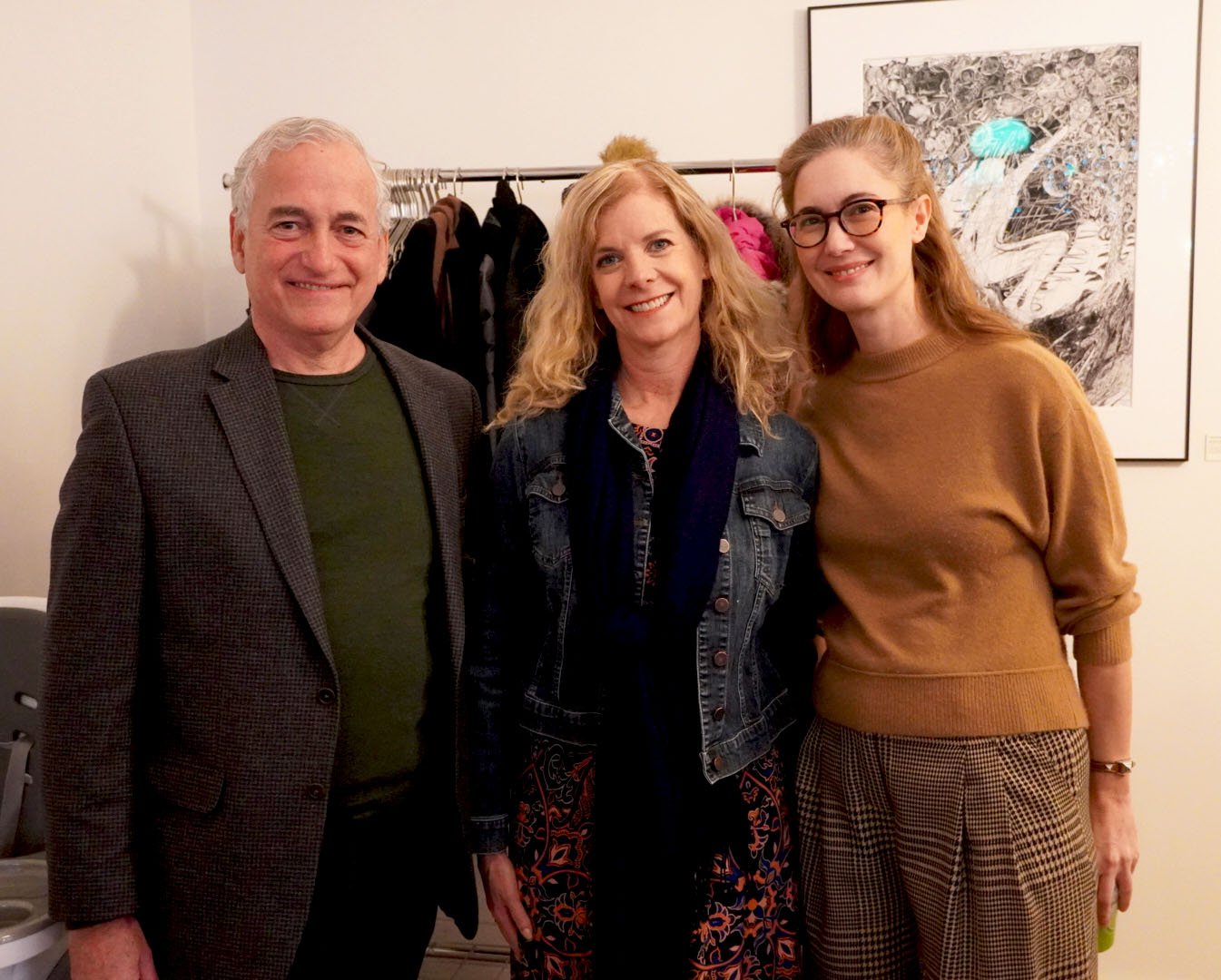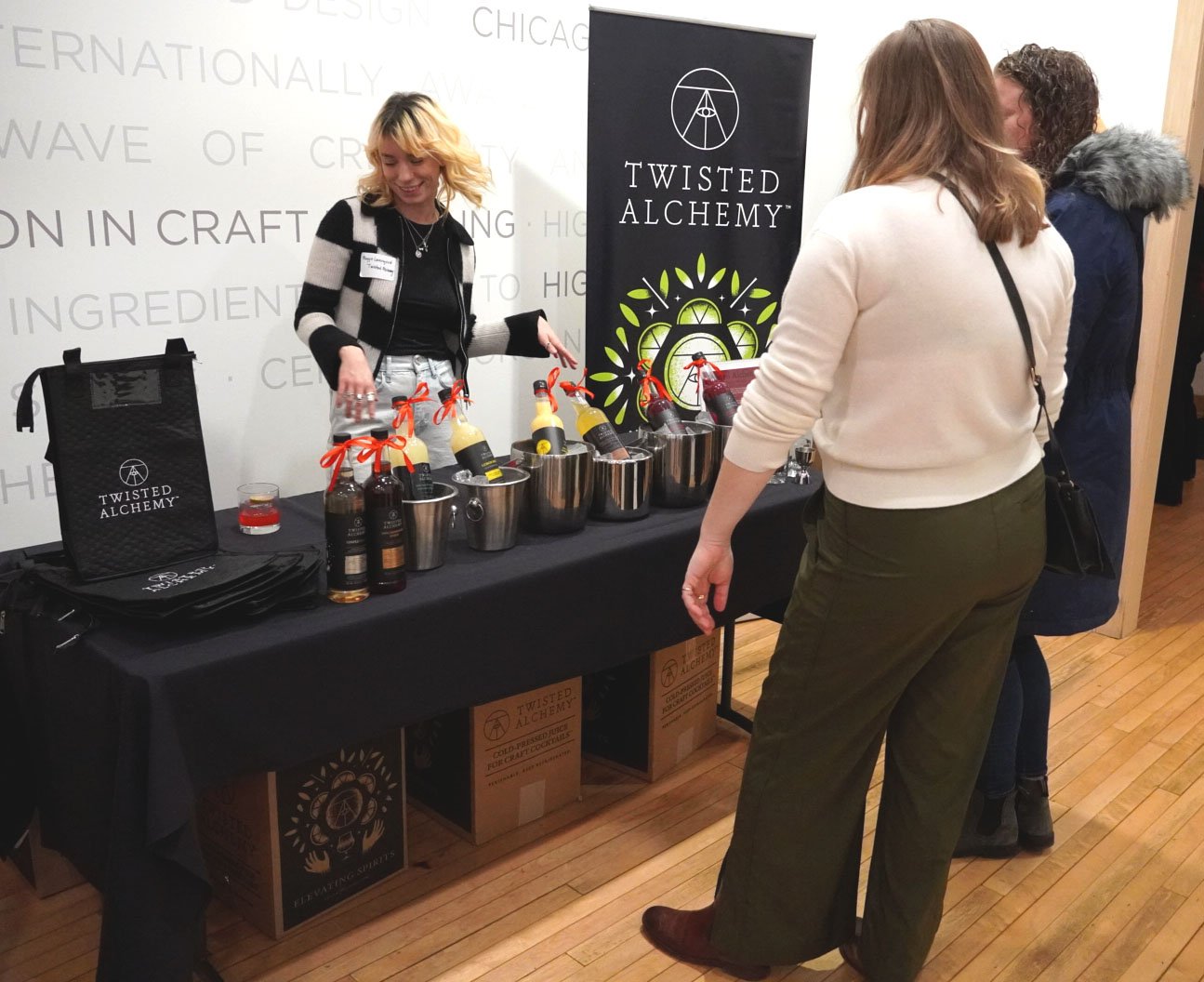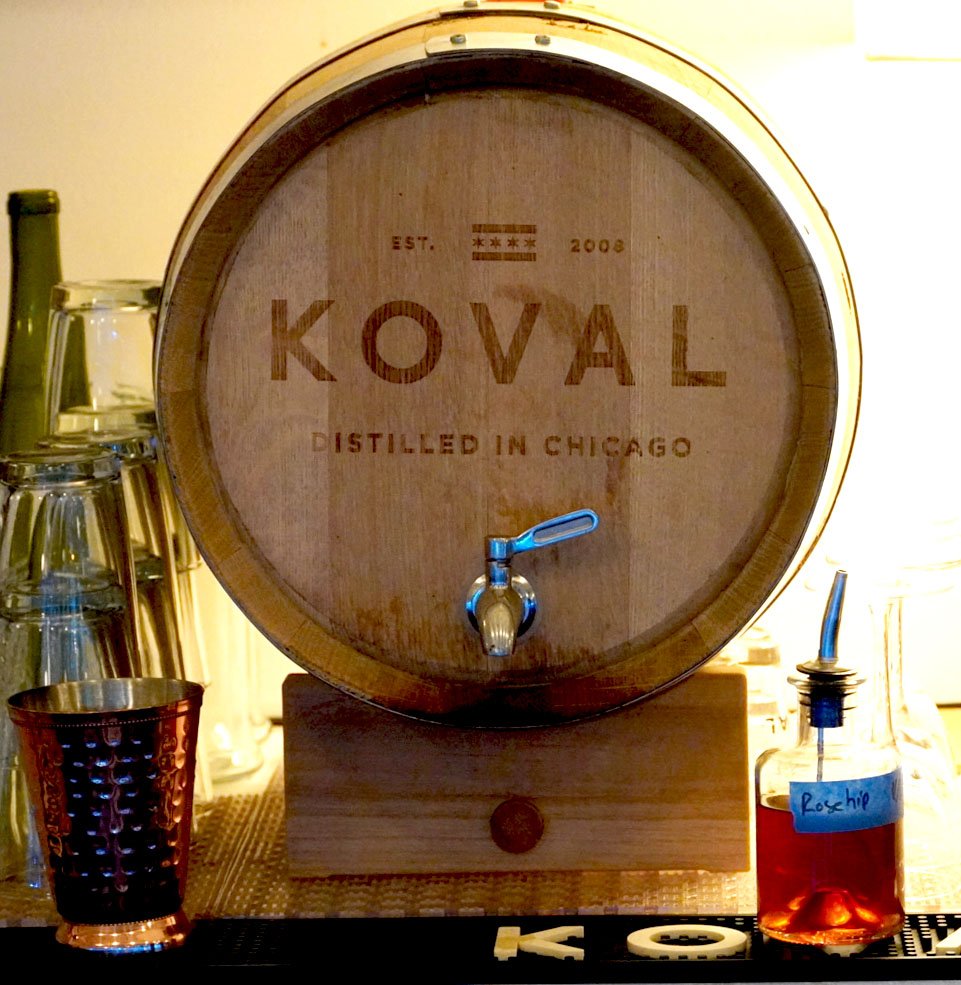Cocktails and Conversations at Koval: A Libations Learning Experience
Photos by Bob Benenson
Many of us have visited distilleries, and quite a few of us have attended panel discussions about the state of the adult beverage industry. But our Cocktails and Conversations event on the future of beverages, held November 28 at Koval on Chicago’s Malt Row, probably was the first time any of us attended a panel discussion inside a distillery.
The centerpiece of an event that was the right balance of fun and learning experiences, the panel took place on a platform that, on most days, is the starting point of Koval’s distillery tours. There we gained insights from these three local beverage industry luminaries:
Dr. Sonat Birnecker Hart, the event's host, gave up a career in academia in 2008 when she and husband Robert Birnecker launched Koval as the first distilling business in Chicago since Prohibition. From Day 1, Koval — with Sonat as President — has been an independent, private, family owned and operated company that is dedicated to local and sustainable sourcing. All of their products are made from grain to bottle in Chicago, and Koval controls its entire supply chain from the contracting of local cooperative of Midwestern organic farmers to its New American Oak barrels from the forests of Minnesota. Every step of the process is documented to the point at which every bottle can be traced back to the fields on which the grain within was grown.
Kim Holstein is Co-Founder and President of Twisted Alchemy, the local company that produces fresh, 100% all-natural cold-pressed juices and mixers for bars, restaurants, hotels, and anyone creating high-quality, fresh, authentic handcrafted cocktails and mocktails. She is a self-described serial entrepreneur with husband Scott Holstein, and the couple previously ran Kim and Scott's Gourmet Pretzels for 15 years. Kim is a member of the Naturally Chicago Board of Directors, and delicious Twisted Alchemy cocktails are familiar to attendees of our live events.
Giuseppe Infusino, who will moderate the conversation, is Managing Partner and Chief Investment Officer at InvestBev, a investment firm founded in 2020 that is dedicated to the adult beverage industry. Stating that adult beverages are a growth sector, InvestBev partners with companies primed for expansion and industry disruption to help them grow. Giuseppe is a seasoned investor with experience across real assets and consumer sectors, and has overseen the investment of several billion dollars across multiple private equity and venture capital strategies and sectors.
The following are takeaways from their engaging and informative discussion, interspersed with photos of the Koval cocktails, lively socializing and delicious food from Steingold’s of Chicago that made the evening such a success.
Giuseppe Infusino of InvestBev served as the panel’s moderator
Giuseppe: I've been in the private market investment space my whole career, 15 years or so. For the last five, we've all been focused on adult beverages... It is the kind of industry that it is non-correlated to the general economy. People are drinking in good times and bad... We have an equity fund series, as well as an accelerator for early stage brands in the adult beverage space... There's so many ways to stub your toe, spend a lot of money, spend a lot of time and make a lot of mistakes... So we created this accelerator to to help folks avoid that.
Dr. Sonat Hart, a former college professor, co-founded and co-owns Koval Distillery with husband Robert Birnecker. Sonat served as company president. and Robert is the master distiller.
Sonat: My husband and I started Koval in 2008. We started it because, at the end of the day, we just wanted to live in Chicago.... When we started, there were very few craft distillers in the United States... When we started Koval, once the [Chicago] Tribune wrote about us, I would get these phone calls, literally every other day, saying, “I want to know how to do it for real.” So when we started Koval, we also simultaneously started a consulting company called Kothe Distilling Technologies, where we've set up over 200 distilleries all over the U.S., Europe, Africa, Middle East, all over South America, and worked with a lot of the companies that produce the hardware... We reached out to the companies abroad saying, “Do you want your your website translated into English? And can we represent you in America.”... We slowly built vertical business models that helped us grow in an industry that requires a lot of money upfront.
Kim Holstein serves as President and “Chief Alchemy Officer” at Twisted Alchemy, the cold-pressed juice company she co-founded with husband Scott Holstein.
Kim: My husband Scott and I had a pretzel company called Kim and Scott’s Gourmet Pretzels for 17 years... After we sold our company, we definitely struggled with what's next... We learned in our pretzel company that with HPP technology, we can actually have the fresh juice and not use heat but use pressure, and therefore maintain the enzymes in the flavor profile. Quite often we will do taste tests with fresh juice and ours and we'll win, which has been really exciting. It's been the opportunity to take fresh juices, put them in a bottle and save bartenders around the country from squeezing juices. So that's how Twisted Alchemy was born. We launched the brand in 2019 and had an amazing start-up working with hotels, bars and restaurants. Then COVID hit and being in the hospitality business, that was quite painful to lose every customer in a day... We had a pivot to bring the bar home, and then the bars and restaurants did open and needed us to provide real labor solutions.
Giuseppe: How have things changed in the beverage industry?
Kim: What we saw is more chefs and bartenders using spices and herbs and creating new versions of beverages. Then also a healthier-for-you trend, people wanted to build their immune systems and have some healthier options. That's been exciting for us, just taking a cocktail with a wellness approach.
Sonat: When we started, there were only 50 craft distillers. Now there are over 4,000. That being said, the pandemic really changed everything. Many of the small distilleries that have been successful were purchased by the big guys. I would say we're probably the largest completely independent craft distillery in the U.S. There are many other ones that have investors, they have big brands behind them, sometimes secretly... So they're still seemingly the craft brands, and not all the consumers are aware that their brand that they thought was local and even made locally may not be anymore or it's been taken over by large brands....
During the pandemic, there was a great acceleration in how consumers buy things in general. A lot of it went online, and a lot of it went towards convenience. It's nice to get your groceries delivered to your front door when it's 10 degrees outside. But what one has to understand is that with that comes an entirely new world that is paid for by ad dollars and who can buy the most ad dollars. It's not going to be the independent companies. And I can tell you to pay for clicks on all of these liquor platforms, they are asking you to pay the money to maybe even just be on the platform to begin with. So there is so much pay to play now.
Giuseppe: Even before the pandemic, in bars and restaurants people wanted to see things paired with great menus, and wanted the drinks to be on par with those types of things. Do you feel like that's kind of moved into the home where people want that bartending experience, to say, now I'm having a better sense of what I'm making, I can have that same artistry and understanding?
KIm: People were stuck at home and they started to craft more cocktails and tapped into that cocktail enthusiast, started having a lot of fun with it. And then when people could come over, there was this whole time entertaining, and wow, I could make fresh cocktails for everyone... People are post-COVID and love to go out. But they also have this other experience of entertaining at home... I'm interested to see how that will translate more at retail, where the retailers think about that experience for consumers and create more of a set... You can get everything together and you can be that mixologist at home.
Sonat: There were a lot of people that learned a lot of new things and that is carried over. But I think there is also just a desire for people to go back out and have service and enjoy the service. So there's, there's definitely a little bit of both... If we want to support local, whether you're going to do ir in home, or at a tasting room, you should just support the local brand.
Jim Slama, Naturally Chicago’s Managing Director, iwith Kim Holstein and Dr. Sonat Hart.












